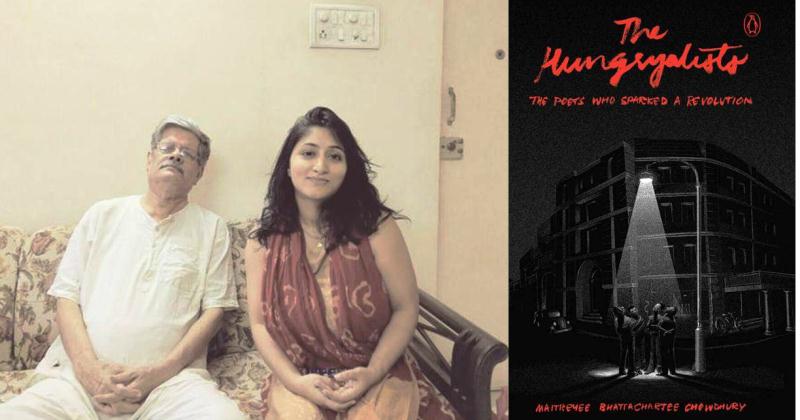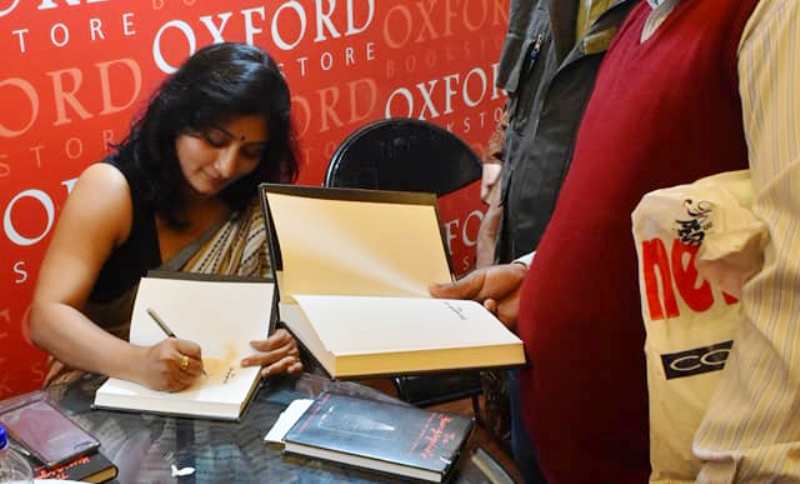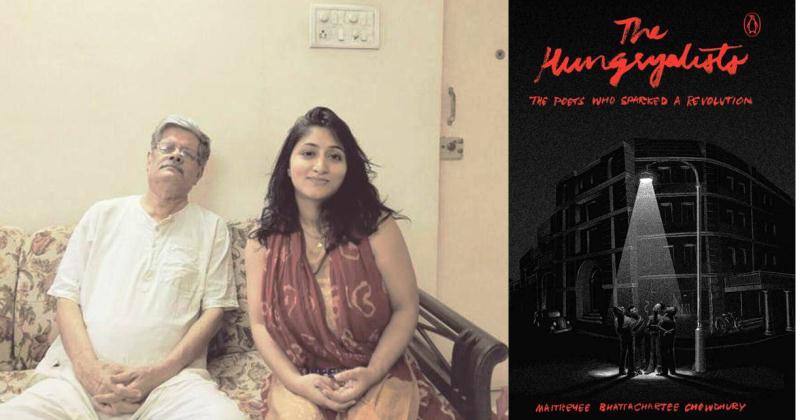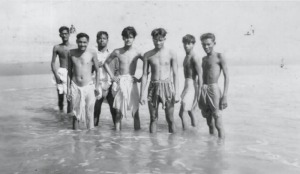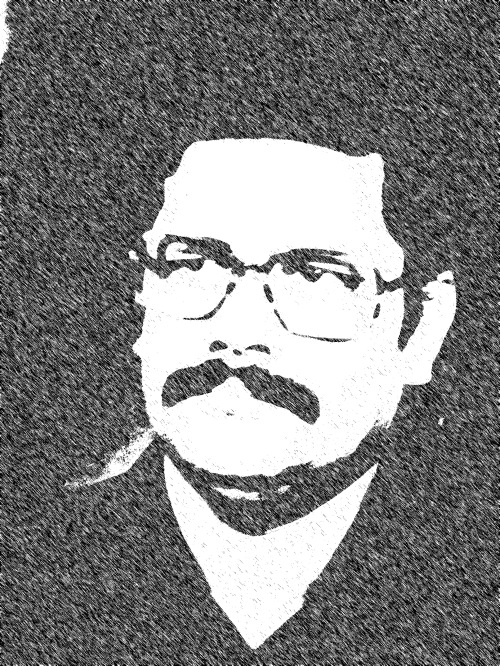In
a city roiled by poverty, immigration, violence and the energy of
youthful anger, a new generation of writers staked their claim, says Maitreyee B Chowdhury
In October
1962, young poet Malay Roy Choudhury boarded the newly launched Janata
Express at Patna. The train would stop in Delhi before it reached
Calcutta—a rather tedious journey that would go on for over two days.
Malay hoped Calcutta would be pleasant this time of the year. His elder
brother, Samir, had written to him just before he had left for Calcutta.
You’ll reach just in time to see the city being decorated for Durga
Puja. Ma arrives in the most beautiful colours and people make the most
creative podiums for her to be worshipped in. The kashphool would have
spread its abundance. You’ll find them everywhere if you care to look,
spread out sleepily in the emptiness outside the city. The sound of dhak
will be everywhere and if you’re lucky, you’ll find some of the dhakis
at the Howrah station when you arrive. Malay wondered if Calcutta had
changed Samir. Patna was dry and without a trace of chill. The narrow
seats and the stale air that greeted him in the third-class compartment
were terrifying. He was carrying two small bags, his underwear peeking
out of one, some papers and a few packets of crisps from the other. It
was still early evening, with reluctant bogies idly basking in a gentle
sun. It was Malay’s first trip to Calcutta after the establishment of
the Hungry Generation.
Before the year would end, Malay would
meet American poet Allen Ginsberg in Calcutta. It was February 1961 when
Ginsberg landed in Bombay. A nuclear face-off had just been averted in
Cuba and Delhi was at loggerheads with Peking—a border dispute had
pushed the two countries to the brink of war. And just like everywhere
else, poets, writers and thinkers in India too were affected by these
events.

City for Poets | Calcutta ca. 1945
Ginsberg visited many places in the
country, including Benares, Patna, the Himalayan foothills and Calcutta.
During his trip, he spent most of his time mingling with like-minded
poets, musicians and artists, and later wrote about them in great detail
in his Indian Journals. In Calcutta, between keeping company
with Ashok Fakir in ‘Ganja Park’—an area near the main road stretching
from Chowringhee to Rashbehari Avenue—and hallucinating at Kali’s feet
while lying in her temples, Ginsberg would walk around the city or watch
bodies being burned in the ghats. To the ever-sceptical Bengali, he
might have seemed like just another disillusioned westerner doing the
rounds of holy Indian cities, in search of drugs, sex and ‘exotic’
spirituality. Not many Indians at the time were aware of Ginsberg’s
reputation or the influence he wielded back home. Ginsberg, of course,
had read ‘Howl’, his legendary poem, at Six Gallery in San Francisco by
then, and had begun shaping the American approach and reaction to
poetry. What effect his presence would have on the poets in Calcutta, or
they on him, time would tell vividly. But for now, he was one of them—a
poet and a wanderer, who carried with him a turbulent and disturbed
past, with the belief that here, of all places, he would be accepted no
matter how dirty or disillusioned he was.
The train moved slowly, as if struggling
with a natural inclination for inertia. Malay remembered what Samir had
written to him from Calcutta while he was in Patna. He had been angry
with their father for sending him away to Calcutta after school. The Roy
Choudhurys had decided to move from Imlitala, their Patna
neighbourhood, which their father considered a bad influence on the
boys. Pretty early on in life, the place had exposed them to free sex,
toddy, ganja, and much more. Their father had built a new house in
Dariapur and the family had shifted there. Subsequently, when Samir was
sent to Calcutta, it was a double blow for him, to be removed at once
from Imlitala and his family. Calcutta was a city he knew almost nothing
about. His instructions to Malay had been clear—he was going to live
vicariously through his brother in Patna. On certain days, Samir would
almost be pleading with Malay in his letters.

Fraternity: (Standing, from left) Saileshwar Ghosh, Malay Roychoudhury, Subhash Ghosh; (seated) Subimal Basak, David, Basudeb Dasgupta
Dear Malay,
Near
the chariali next to our house is a woman who sells bidis for two annas.
Buy a packet from her, hide it in your trunk and bring it for me when
you’re in Calcutta. Remember, nobody should know about this.
Dada
And another about a month later read:
Dear Malay,
Apparently,
there are many things to do here, but I don’t know where to start. I
have made a few friends; we meet at the Coffee House regularly. Deepak
[Majumdar], Ananda [Bagchi] and Sunil [Ganguly] are close to me.
Sometimes we discuss kobita [poetry], at other times, it is the state of
affairs. Everyone is angry here; there are strange people I meet on the
road. Theyare not like the poor of Imlitala; they have a lost look
about them. They don’t look or feel poor when you talk to them—all you
can understand is death on the inside. I think they have lost a dream.
It makes me feel horrible; I miss the easy poverty of Imlitala . . . You
must go to Bade Miyan’s paan shop at the end of our lane and tell him
about the paan that I used to have, hewill know. You could have one
yourself, but I fear it might not be good for you. You must bring one
for me though. It will cost you one anna.
Dada
Malay could not understand from Samir’s
letters whether he was happy in Calcutta or not. But he sensed some
anger. He seemed like a revolutionary without an understanding of what
his revolt was about. Malay wished Samir knew how much he wanted to see
Calcutta—this city where poems were read aloud on the streets; where a
Shankha Ghosh, even at the height of his literary career, could be
approached by college students; where Shakti Chatterjee would recite
poetry on the stairs of the Coffee House. Samir’s shift to Calcutta
indirectly helped Malay in many ways. It was Ashadh of 1952 when Malay
next received a letter from Samir. It had been raining for two days and
the blue inland envelope was wet when Malay fetched it from the
letterbox. Unlike his previous letters, Samir sounded excited in this
one—it was the first time he had forgotten to mention Imlitala.
Dear Malay,
Last
evening, Sunil, Shakti and Deepak came home. My room is small, and the
bed has too many books on it for me to move them. We sat on the terrace
adjoining my chilekothar [an attic-like room]. While it didn’t matter to
either Sunil or Deepak, I was glad I had the small mat Ma had insisted I
bring from Patna. Tha’mma doesn’t stir out of her room after dusk, so
it was OK for Sunil to bring his smoke. Thanks to the gondhoraj lebu
plant that is full of flowers and small bulbs of lemons, the smell of
smoke was confined to the terrace. We talked for a long time;
thankfully, none of them were in a hurry. Tha’mma might ask a lot of
questions tomorrow though. Sunil is full of ideas; he says he wants to
start a magazine. He is still not sure how to go about it though, but he
says he is bored of reading the same kind of writing. I told him what
you and I have talked about so many times. He seemed a bit surprised at
first, and then asked me about you. Deepak was quiet all evening, but he
sang a song later. Kaka came up to meet us. Later, he and Deepak talked
about Hindi film heroines. Their discussion made Shakti and me laugh a
lot. There was not much to eat, but Sunil had bought some pakoras on the
way; we ate them and, later, licked the plate clean. Sunil went through
my books and wanted the [Victorian poet, Algernon Charles] Swinburne
collection. I can give it to him only later, which is what I told him. I
hope he didn’t take offence though.
More later,
Dada
Many new writers were Samir’s classmates
in City College. There were other established ones, Coffee House
regulars, whom Samir had befriended and would discuss literature with.
Shakti and Sunil came up quite often; they were close friends, who had
been to his family home in Uttorpara a few times. Sunil was a prolific
and acclaimed novelist, but poetry was his first love. Indeed, Samir,
who’d recognized his talent early on, went on to fund and publish
Sunil’s first book of poems, Eka Ebong Koyekjon. Samir would
have intense discussions with Deepak, Sunil and Shakti on many an
evening on the kind of literature they had all grown up with and began
to believe in. Subsequently, he got deeply involved with Sunil in
establishing Krittibhash—a journal that launched many a Bengali poet at that time. Deepak, Ananda and Shakti were also compatriots in this venture. Krittibhash
found its voice in 1953. Samir always kept his brother in the loop, and
Malay would occasionally receive large paper packets containing
literary periodicals and books of poetry. Now as the train moved towards
Calcutta, Malay felt as if his life was coming full circle. It had been
a strange decision to visit the city at a time when post-Partition
vomit and excreta were splattered on Calcutta streets. Marked by
communal violence, anger and unemployment, the streets smelled of hunger
and disillusionment. Riots were still raging. The wound of a land
divided lingered, refugees from East Pakistan (now Bangladesh) continued
to arrive in droves. And since they did not know where to go, they
occupied the pavements, laced the streets with their questions,
frustrations and a deep need to be recognised as more than an
inconvenient presence on tree-lined avenues. The feeling of being
uprooted was everywhere. Political leaders decided that the second phase
of five-year planning needed to see the growth of heavy industries. The
land required for such industries necessitated the evacuation of
farmers. Forced off their ancestral land and in the absence of a proper
rehabilitation plan, those evicted wandered aimlessly around the
cities—refugees by another name.
Calcutta had assumed different
dimensions in Malay’s mind. The smell of the Hooghly wafted across
Victoria Memorial and settled like an unwanted cow on its lawns. Unsung
symphonies spilled out of St Paul’s Cathedral on lonely nights; white
gulls swooped in on grey afternoons and looked startling against the
backdrop of the rain-swept edifice. In a few years, Naxalbari would
become a reality, but not yet. Like an infant Kali with bohemian
fantasies, Calcutta and its literature sprouted a new tongue—that of the
Hungry Generation. Malay, like Samir and many others, found himself at
the helm of this madness, and poetry seemed to lick his body and soul in
strange colours. As a reassurance of such a huge leap of faith, Shakti
had written to Samir:
Bondhu Samir,
We had
begun by speaking of an undying love for literature, when we suddenly
found ourselves in a dream. A dream that is bigger than us, and one that
will exist in its capacity of right and wrong and beyond that of our
small worlds.
Bhalobashajuriye
Shakti

Malay in Nepal
Patna, October 1961. Shakti and Haradhan
Dhara met Samir and Malay at the brothers’ newly built house. Evening
crept stealthily on to their shoulders and sat still there. The Roy
Choudhurys were still in a transitional frame of mind. The brothers had
not forgotten Imlitala—its terrific chaos, the shadows of their
childhood and their small house. The new house in Dariapur on Abdul Bari
Road looked spick and span, and stupid. “Not a house for me, not for
me!” Malay would shout at the walls. But their father would have none of
it—in his vision for his family, Imlitala was a matter of the past.
Nearby, in Rajendra Nagar, lived Hindi writers Phanishwar Nath Renu and
Ramdhari Singh Dinkar. They belonged to the Nayi Kahani and Uttar Chhaya
Wadi movements respectively—groups that believed in largely
individualistic, urbanistic and self-conscious aesthetics. While Renu
was critically acclaimed as among the most powerful and brilliant
writers of his time, Dinkar had a huge impact on readers of Hindi
poetry. He went on to become a renowned poet of national standing. His
poetry, a precursor to the A-Kavita movement, would later emerge in the
sixties as a contemporary influence, inspired in some ways by Ginsberg
and the Beat journey. Samir’s regular interactions with them would leave
a deep impact on his thinking and mould his poetry in the future.
Sometime later, Dinkar, who belonged to the community of Bhumihars,
would abandon his caste to make an important statement on caste
politics.
It was nine in the evening; dinner was
over. None of them had ventured out all day. Malay insisted that Shakti
visit Imlitala with him: “I miss Naseem Apa—her fragrant hair, the curve
of her back, the way she ran after I kissed her hazaar times in the
shadow of the imam. Shakti, come with me to see her, won’t you?” Shakti
was overwhelmed by the romanticism of a ghetto being named after a tree.
He had been eager to see the imli tree after which Imlitala was named.
“Will there be an enactment of Radha–Krishna’s sharad purnima rasa
dance?” he asked. “Did the imli tree have a golden wall after the legend
of Krishna turning a golden hue while searching for his beloved Radha,
who had disappeared in between their dance?” Malay was amused. He had
not witnessed any religion in Imlitala. Everyone born there was sworn to
poverty, their only allegiance was to the mad dance of filth around
them. He told Shakti, “Would you like to read your poetry during the
Imlitala fest? Small-time thieves, prostitutes and roadside urchins make
up the audience. Women in pink blouses and green petticoats sit down
with their men to have country liquor, one hip bent on another, and with
dirty hands touch each other. Some love will flow, some lust too.
You’ll need a different lens to be able to see this poetry.” Samir
sounded a warning that the police might be there too. “Wherever poetry
is, the dogs follow,” Malay quipped. A round of laughter followed.
Excerpted from The Hungryalists, forthcoming from Penguin India. Published in the Jan-Mar 2019 issue.

